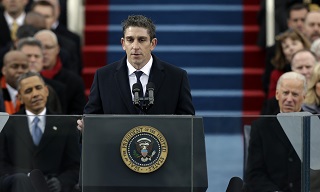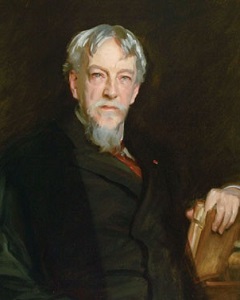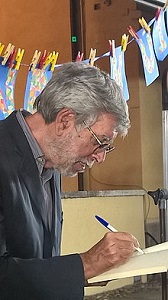De Amerikaanse dichter en schrijver Richard Blanco werd geboren op 15 februari 1968 in Madrid. Zie ook alle tags voor Richard Blanco op dit blog.
Uit:For All of Us, One Today
“Days before our field trip to the science center, Mrs. Bermudez tells our class the sun is actually hundreds of times larger than the earth. We move around it. We’re nothing, zooming through dark space, she says, matter-of-factly, as if it didn’t matter that we were no longer the center of our own little worlds. We, with crayons in our hands coloring dittos of the sun and our nine planets. We, at our desks but also helplessly zooming through cold, empty space. I don’t want to believe her; the sun is the size of a sunflower, I insist. I draw lemon-yellow petals around it and color its center sienna brown. The first time I see a lion I am nine years old, my grandfather’s hands holding me back from the cage I want to open. I can still feel his grip and the lion’s eyes staring at me like tiny, amber planets behind bars, asking me to set him free. My first kiss was under the shade of moonlit palms in Janet Carballo’s backyard, exactly two days before the end of the school year. But I’m still feeling the powdery skin behind her earlobes, smelling her strawberry lip gloss and the orange blossoms in the air already thick with summer. I never saw a comet until I was twenty-four, cupped in the darkness of the Everglades and the arms of a man I loved. It was past midnight on a Sunday, I remember; I didn’t go to work the next day. I’m still sleeping with the mangroves and the ibis, under a masterpiece of stars. The comet’s tail a brushstroke of pure, genius light.
These are more than memories. They are what lives—and relives—inside our bodies, in every cell and heartbeat. The undiscovered DNA of our souls imprinted with the minute details of those eternal moments that change our lives, our stories, forever. Sometimes they’re subtle, sometimes dramatic, but we know nothing will ever be the same the instant we experience them. And quite often they are unexpected.
On the afternoon of December 12, while casually driving back to my home in Maine, I receive a phone call with the news that I have been chosen as inaugural poet. Bewildered, I first wonder if it could be some cruel joke a friend might be playing on me. You mean like Robert Frost? Like Maya Angelou? I ask, wanting confirmation that what I just heard is true. Yes. Yes, I’m told, as I keep driving down the interstate in a daze, trying to speak, trying to fathom what has just happened. But I know. My body knows it’s the most important moment of my life as a poet, a day by which I will mark the rest of my life, the day I learned that I will be named the fifth poet ever in our history to be US Inaugural Poet.

Richard Blanco (Madrid, 15 februari 1968)
Hier bij de 2e inauguratie van president Obama in 2013


